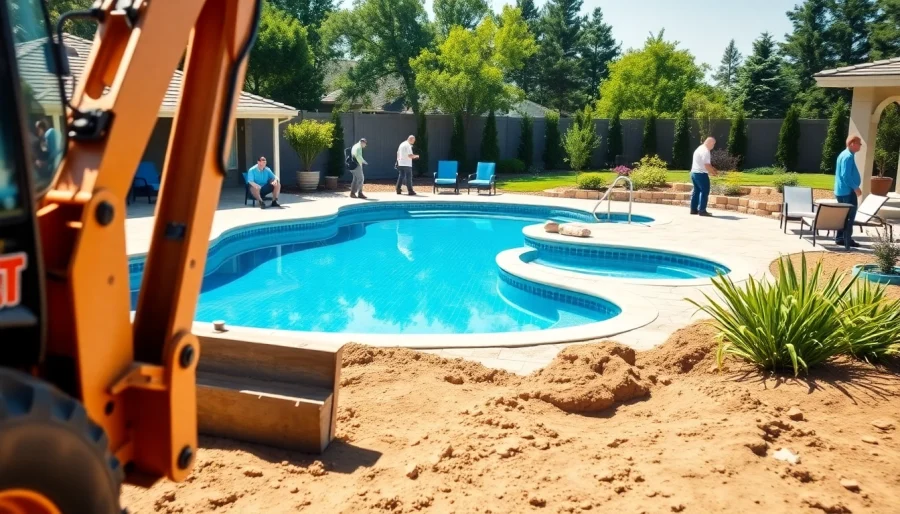Understanding Pool Construction Basics
Building a swimming pool is not only a significant investment but also a transformational addition to any property. Pool construction involves a variety of processes and decisions that can shape the final product significantly. Understanding the pool construction landscape will empower homeowners to make informed decisions throughout the project. This section covers the key fundamentals of pool construction, aided by insights into what homeowners need to consider before diving into this significant project.
What is Pool Construction?
Pool construction refers to the process of designing and building swimming pools. This encompasses everything from the initial planning stages through to the completed pool ready for use. Depending on the type of pool being built—whether it be above-ground, in-ground, vinyl, fiberglass, or concrete—the processes and methods will vary, but the goal remains consistent: to create a safe and aesthetically pleasing swimming environment for enjoyment.
Types of Pools and Their Construction Styles
There are primarily three types of pools, each with characteristic construction styles:
- Concrete Pools: Known for their durability and customization options, concrete pools are constructed by pouring concrete into a mold. They can be designed in any shape or form, allowing for complete creativity in design.
- Vinyl Liner Pools: These pools use a flexible liner that covers the interior surface. They are generally less expensive than concrete pools and are easier to install, making them a popular choice for many homeowners.
- Fiberglass Pools: Prefabricated and delivered to the site, fiberglass pools can be installed relatively quickly. They come in a limited number of shapes and sizes but offer excellent insulation and lower maintenance.
Key Considerations Before Starting
Before embarking on the pool construction journey, homeowners should consider several key factors:
- Budget: Establish a clear budget that encompasses all aspects of pool construction, from design to maintenance.
- Space Allocation: Evaluate the available space in your backyard and how the pool will fit within the overall landscape.
- Local Regulations: Investigate local building codes and regulations regarding pool construction to ensure compliance.
- Maintenance: Consider how much time and resource you are willing to invest in maintaining your pool post-construction.
The Pool Construction Process
Step 1: Planning and Design Phase
The first step in pool construction starts with careful planning and design. Homeowners often consult professional pool builders to help design a pool that meets their desires and fits within their budgets. This can include 3D modeling and layout designs to visualize how the final product will look and function.
Step 2: Excavation and Foundation Work
Once the design is deemed satisfactory, the next phase involves excavation. Heavy machinery is used to dig a hole in accordance with the planned dimensions. Following excavation, a foundation is established with a layer of sand or gravel to provide a stable base for the pool structure.
Step 3: Plumbing and Electrical Installation
This critical phase includes the installation of plumbing lines для water circulation and electrical connections for lighting, pumps, and heating systems. Proper installation at this stage ensures that the pool functions efficiently and complies with safety standards.
Materials Used in Pool Construction
Concrete vs. Vinyl Pools: Pros and Cons
When deciding between concrete and vinyl pools, it’s essential to weigh their advantages and disadvantages:
- Concrete Pools:
- Pros: Highly customizable, durable, can accommodate unique landscaping designs.
- Cons: Longer construction timeline, can be more expensive initially, potentially high maintenance costs.
- Vinyl Pools:
- Pros: Shorter installation timeline, lower initial cost, easier to replace liners.
- Cons: Less durable, may need replacement every 10-15 years, limited customization compared to concrete pools.
Choosing the Right Tile and Finish
The aesthetic appeal of a pool greatly depends on its finishing touches. Choices include tiles, plaster, and aggregate finishes. Each material offers different visuals and textures, allowing homeowners to elevate the design and feel of the pool area.
Sustainable Materials for Environmentally Friendly Pools
With growing concerns about the environment, many homeowners are opting for sustainable materials in their pool construction. Features such as solar heating systems, energy-efficient pumps, and natural stone finishes can significantly reduce the ecological impact of a pool.
Cost Breakdown for Pool Construction
Average Costs by Pool Type and Size
The cost of constructing a pool can vary dramatically based on several factors, including the type of pool, size, materials, and additional features. Here’s a general breakdown of what you might expect:
- Concrete Pool: $30,000 to $100,000+
- Vinyl Pool: $25,000 to $50,000
- Fiberglass Pool: $20,000 to $60,000
Hidden Costs to Consider
Alongside the upfront costs, it’s vital to recognize hidden expenses that can emerge during pool construction, such as:
- Site preparation and grading
- Permits and inspections
- Landscaping around the pool
- Ongoing maintenance and utility costs
Financing Options for Your Pool Project
Many pool construction companies offer financing options to help manage the cost. Home equity loans, personal loans, or specialized pool financing can help make the dream pool more accessible to potential homeowners.
Choosing the Right Pool Builder
What to Look for in a Pool Construction Company
Choosing the right pool builder is critical to the success of your project. Look for companies with a proven track record, positive customer reviews, and transparent pricing structures. Furthermore, it’s beneficial if the builder specializes in the type of pool you wish to construct.
Questions to Ask Before You Sign a Contract
Before committing to a contractor, consider asking the following questions:
- What is the estimated timeline for completion?
- What warranty do you offer on the pool and its components?
- Are you licensed and insured?
- Can you provide references from previous clients?
Post-Construction Support and Maintenance
After your pool is constructed, maintenance becomes crucial to its longevity and enjoyment. Many contractors offer post-construction support services, including regular maintenance checks, cleaning, and repairs. Establish a routine maintenance schedule to keep your pool in pristine condition and prolong its lifespan.
